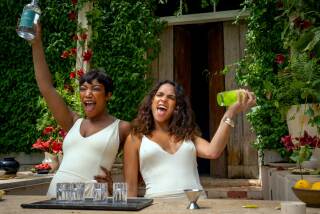‘Flipped’ and charmed
As he proved so winningly in “Stand by Me,” Rob Reiner is a filmmaker who has a way of telling stories about kids, suffusing them with ambivalence and insecurity about their still-evolving selves that feels both heartfelt and authentic.
So it is, once again many years later, with “Flipped,” a tale of very young love and loss also set in the ‘60s. And though our two lovebirds, Juli and Bryce, live in white, middle-class suburbia, the experience feels universal and the oft-trod coming-of-age terrain feels newly turned.
It begins in typical grade school fashion. Juli is all dreamy and swoony over the blue-eyed Bryce. He can barely talk, because, yuck, she’s a girl. She is undeterred. He’s convinced his life is over. We’ve seen it before — what more can you expect?
Thankfully a lot, starting with the freshness of the fine blueprint from Wendelin Van Draanen’s popular contemporary young teen romance. Though Reiner opted to set it back in time by a few decades, he and co-screenwriter Andrew Scheinman have remained true to the spirit, style and a lot of the dialogue she created. But then from “Stand by Me,” that 1986 classic ode to boyhood based on the Stephen King novel, Reiner has become something of a savant when it comes to turning books into movies, with “The Princess Bride” and “Misery” among his standouts and “Flipped” about to join them.
When Juli and Bryce meet (played by Madeline Carroll and Callan McAuliffe for most of the film), it’s because his family has just moved to her tree-lined street, a place where kids ride bikes, play pickup football in the frontyard and go trick-or-treating without fear. Director of photography Thomas Del Ruth has given it all a Norman Rockwell glow that echoes his collaboration with the filmmaker on “Stand by Me.”
We are drawn into their world from two distinct points of view — his and hers. That “he said, she said” push and pull is one of the cleverest conceits of the book and the film. We see a moment through Juli’s eyes, then rewind and see it through Bryce’s with Reiner capturing all the fun, irony and heartbreak possible out of those different points of view.
With that as the starting point, we follow the kids through the ups and downs of grade school, family life and their growing (or not) attraction. Both young actors find that ideal balance of charm and intelligence without veering into too precocious and too pretty (which Ashley Taylor takes care of for everyone else, but as Juli’s popular, perky, pony-tailed nemesis, she’s supposed to).
A lot of the film is concerned with the idea of growing things other than Bryce and Juli. The fate of a giant sycamore becomes a crucial testing ground for not just their relationship but also for figuring out what is important in life. The school bus and the grade school cafeteria become microcosms of ever-shifting social divides. So many small details are perfectly wrought — the cruel way the kids in school call her name, underscoring her bookish, outsider unacceptable-ness.
Back on the block, there is the “chicken and the egg” controversy that grows out of Juli’s blue-ribbon science fair project on the evolution of chicks, causing a rift between the kids and their families that they might not be able to overcome. In fact, the way in which family frames a life becomes as essential to the film as it does to Bryce and Juli’s developing worldviews.
Bryce is very much a product of an upwardly mobile environment, with Anthony Edwards as Steven, his tightly wound dad who is ever vigilant to ensure nothing tarnishes his hold on success, including Juli’s working-class family. How does he know they aren’t up to snuff? They don’t even take care of their frontyard, a weed-filled blight on the neighborhood.
It turns out Steven’s conformity issues are not so different from his son’s. Fortunately for the film, he and the rest of the adults — a winning ensemble that includes Rebecca De Mornay, Penelope Ann Miller, Aidan Quinn and John Mahoney — aren’t through growing up either. Mahoney, a little less irascible than he was in “Frasier” but just as insightful, is Bryce’s grandfather and the stick that will prod Bryce into thinking for himself and Steven into rethinking things whether he wants to or not.
Meanwhile, Juli’s family is headed by Aidan Quinn’s Richard, a guy who’s got his priorities straight, even though it means his bank account is slight. But then, as he tries to teach Juli, doing the right thing isn’t ever easy, never more poignantly than when it comes to his mentally disabled brother. In lesser hands, this could all become overly sentimental and sugary sweet, but instead we are treated to the artful nuance that comes from Reiner’s light touch.
Helping to set the tone for the hard lessons here is the kind of great classic rock that a ‘60s era film makes possible. In this the filmmakers have sampled widely — including Carole King and Smokey Robinson — creating a soundtrack so rich you’ll be tempted to close your eyes and just listen.
But don’t. Because “Flipped” is the kind of small, special movie that wraps you up in so much warmth, humor and humanity that it will leave you wishing that stories like this weren’t so rare.
More to Read
Only good movies
Get the Indie Focus newsletter, Mark Olsen's weekly guide to the world of cinema.
You may occasionally receive promotional content from the Los Angeles Times.











